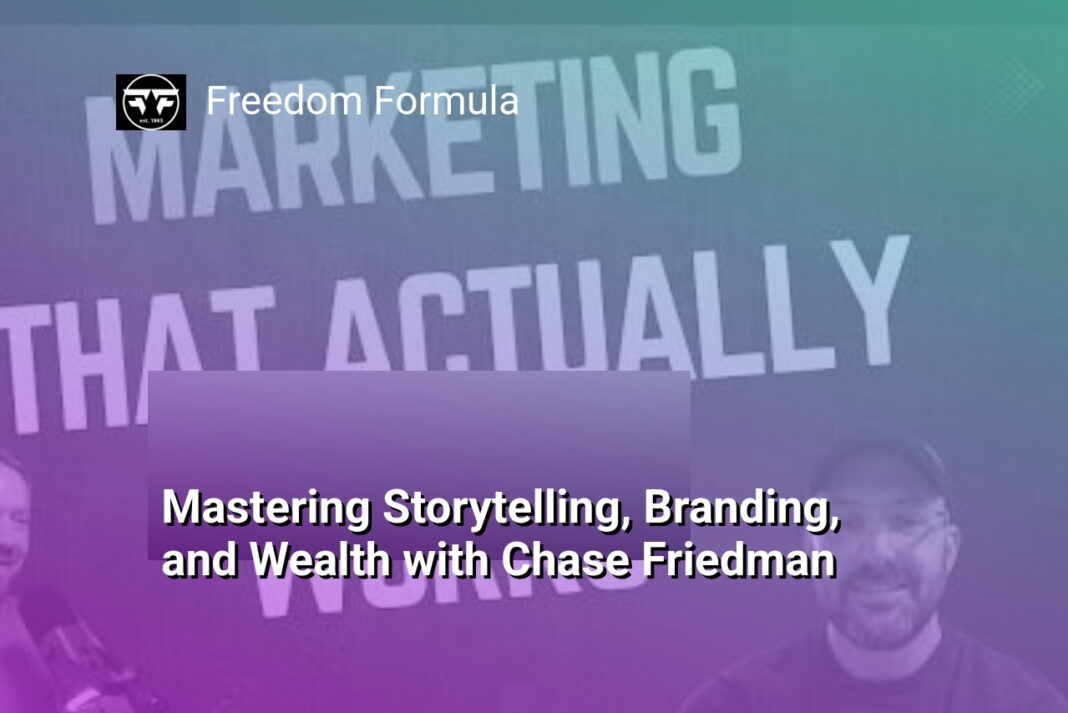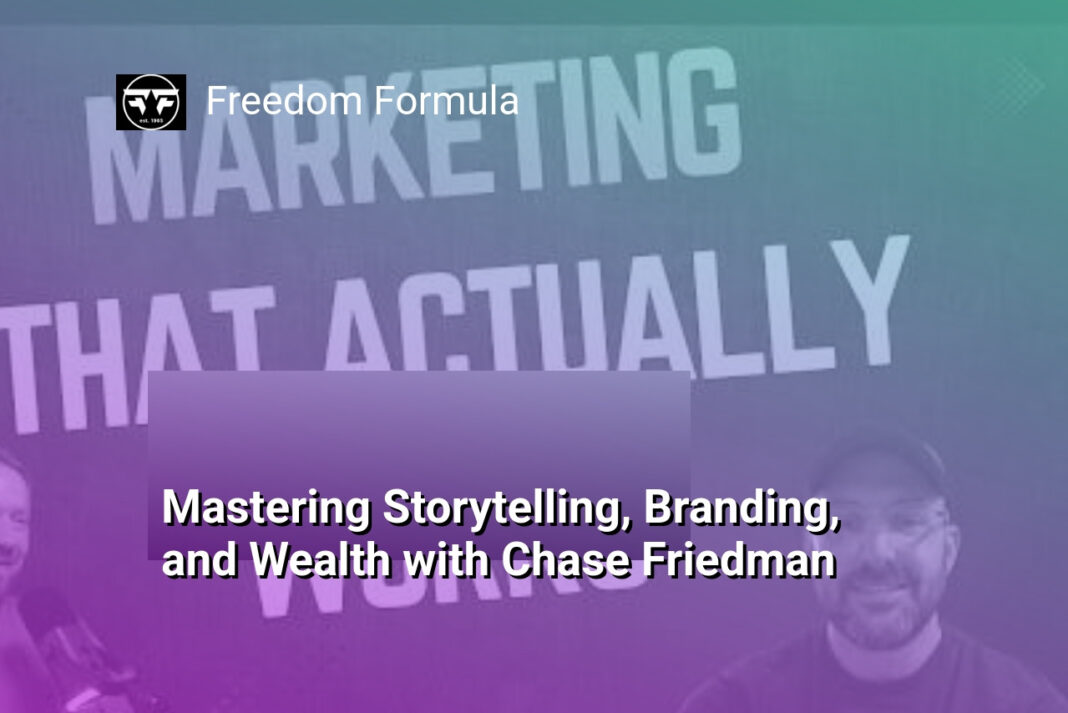The Bottom Line:
- As a seasoned brand strategist, I transitioned from independent filmmaking to digital marketing, recognizing storytelling as the most powerful tool for capturing audience attention and driving meaningful engagement.
- My professional journey underscores the critical distinction between performance and brand marketing, highlighting how emotional connection and long-term brand recognition ultimately triumph over short-term gains.
- Mental and physical well-being are paramount in entrepreneurship, and I advocate for holistic practices that prevent burnout and enable professionals to serve others effectively.
- Financial literacy and understanding wealth management principles are essential for sustainable business growth, with strategic insights like the Rule of 72 providing valuable investment perspectives.
- Purpose-driven businesses that authentically align with their audience’s values and quickly adapt to market needs are more likely to build loyal customer relationships and stand out in competitive landscapes.
From Filmmaker to Marketing Strategist: Chase Friedman’s Unique Path
The Cinematic Roots of Marketing Expertise
Chase Friedman’s journey from independent filmmaker to digital marketing strategist represents a unique trajectory that underscores the profound connection between storytelling and effective brand communication. His early experiences in filmmaking provided him with an intrinsic understanding of narrative structure, emotional engagement, and visual storytelling techniques that would later become instrumental in his marketing approach. By translating the nuanced art of cinematic storytelling into strategic brand messaging, Chase developed a distinctive methodology that sets him apart in the competitive digital marketing landscape.
Bridging Creative Passion and Strategic Vision
The transition from entertainment to marketing was not merely a career shift but a deliberate evolution of his creative skills. Having witnessed the challenging dynamics of the entertainment industry, Chase recognized the parallels between crafting compelling film narratives and developing impactful brand stories. His background in independent filmmaking equipped him with a keen understanding of how to capture audience attention, create emotional resonance, and communicate complex ideas through concise, engaging narratives. This unique perspective allowed him to approach marketing not as a purely transactional endeavor, but as an art form that requires deep psychological insight and creative strategy.
Transforming Storytelling into a Marketing Superpower
By leveraging his filmmaking expertise, Chase developed a holistic approach to brand storytelling that goes beyond traditional marketing techniques. He understood that successful marketing is fundamentally about creating connections, evoking emotions, and presenting authentic narratives that resonate with target audiences. His methodology emphasizes the importance of crafting brand stories that are not just promotional tools, but genuine expressions of a company’s values, mission, and unique identity. This approach has enabled him to help businesses transform their marketing strategies, moving from generic, transactional communications to powerful, memorable brand experiences that drive meaningful engagement and long-term customer loyalty.
The Power of Storytelling in Modern Digital Marketing
Crafting Emotional Connections Through Narrative
In the digital marketing landscape, storytelling transcends traditional advertising by creating profound emotional connections with audiences. Brands that master narrative techniques can transform passive consumers into engaged advocates. The art of storytelling allows companies to communicate complex messages through relatable human experiences, making abstract concepts tangible and memorable. By weaving personal journeys, challenges, and triumphs into brand narratives, marketers can evoke genuine emotional responses that resonate far beyond simple product descriptions.
Narrative Strategies for Digital Engagement
Modern digital platforms provide unprecedented opportunities for brands to share compelling stories across multiple channels. Social media, video content, podcasts, and interactive websites have become powerful storytelling mediums that enable businesses to showcase their unique identity and values. Successful storytelling requires understanding audience psychology, identifying core emotional triggers, and crafting narratives that feel authentic and genuine. This approach moves beyond traditional sales pitches, focusing instead on creating meaningful connections that inspire trust, loyalty, and long-term engagement.
Transforming Brand Perception Through Strategic Storytelling
Strategic storytelling enables brands to differentiate themselves in increasingly crowded markets. By revealing the human elements behind corporate facades, companies can humanize their brand and create deeper audience connections. This narrative approach involves transparently sharing brand origins, challenges overcome, and the genuine motivations driving organizational missions. Effective storytellers understand that consumers don’t just purchase products; they invest in experiences, beliefs, and identities that align with their personal values and aspirations. Through carefully crafted narratives, brands can transform from mere service providers to meaningful cultural participants that inspire and motivate their target audiences.
Performance vs Brand Marketing: Strategic Approaches for Business Success
Decoding Performance Marketing Dynamics
Performance marketing represents a direct, measurable approach to digital advertising where businesses focus on specific, trackable outcomes. Unlike traditional brand marketing, this strategy prioritizes immediate conversions, click-through rates, and quantifiable return on investment. Entrepreneurs like Chase Friedman understand that performance marketing excels in generating quick results through targeted digital campaigns, utilizing platforms like Google Ads, Facebook Advertising, and programmatic networks to drive precise audience engagement.
The Strategic Depth of Brand Marketing
While performance marketing delivers immediate metrics, brand marketing cultivates long-term audience connection and emotional resonance. This approach transcends transactional interactions, building narrative depth that transforms customers into loyal brand advocates. By crafting compelling storytelling frameworks, businesses can create meaningful connections that extend beyond single purchase transactions. Chase’s background in filmmaking significantly influences this perspective, demonstrating how narrative techniques can transform marketing from a purely transactional experience into an immersive brand journey.
Harmonizing Marketing Approaches for Sustainable Growth
The most sophisticated marketing strategies integrate performance and brand marketing principles. Successful businesses recognize that these approaches are complementary rather than mutually exclusive. Performance marketing provides immediate revenue and data-driven insights, while brand marketing establishes foundational trust and long-term customer loyalty. By balancing short-term tactical executions with strategic narrative development, entrepreneurs can create resilient marketing ecosystems that adapt to evolving consumer preferences and market dynamics. This holistic approach ensures businesses can generate immediate results while simultaneously building enduring brand equity and meaningful audience relationships.
Mental Health and Entrepreneurial Resilience
Navigating Psychological Challenges in Entrepreneurship
Entrepreneurial journeys are inherently complex emotional landscapes that demand extraordinary psychological resilience. Chase Friedman understands that mental fortitude is not just a desirable trait but a critical survival mechanism for business leaders. The psychological pressures of running a business can create intense stress cycles that potentially lead to burnout, depression, and professional disengagement. Successful entrepreneurs like Chase recognize that mental health management is not a luxury but a fundamental requirement for sustainable success.
Strategies for Maintaining Emotional Equilibrium
Developing robust psychological coping mechanisms involves intentional practices that support emotional stability. Mindfulness techniques, regular physical exercise, and structured self-reflection become essential tools in an entrepreneur’s mental health toolkit. Chase advocates for holistic approaches that integrate professional ambitions with personal well-being, understanding that peak performance emerges from a balanced psychological state. By prioritizing mental wellness, entrepreneurs can maintain clarity, creativity, and strategic thinking even during high-pressure business scenarios.
Building Psychological Resilience Through Self-Awareness
Psychological resilience is not an innate characteristic but a skill that can be systematically developed. Entrepreneurs must cultivate self-awareness, learning to recognize stress triggers, emotional patterns, and potential burnout indicators. This involves creating personal feedback loops that allow for continuous emotional assessment and adaptive strategies. Chase emphasizes the importance of vulnerability, acknowledging that seeking support—whether through professional counseling, peer networks, or mentorship—is a sign of strength, not weakness. By transforming psychological challenges into opportunities for growth, entrepreneurs can build sustainable mental frameworks that support long-term professional success and personal fulfillment.
Building Purpose-Driven Brands in a Competitive Landscape
The Power of Authentic Brand Positioning
In today’s saturated market, brands must transcend traditional marketing approaches and develop genuine connections with their target audiences. Purpose-driven branding goes beyond mere product promotion, focusing instead on creating meaningful narratives that resonate with consumers’ core values and aspirations. By articulating a clear mission that extends beyond profit generation, companies can differentiate themselves and cultivate deeper emotional engagement.
Crafting Compelling Narrative Strategies
Successful brand storytelling requires a strategic approach that integrates authenticity, transparency, and consistent messaging. Entrepreneurs must invest time in understanding their unique value proposition and communicating it effectively across multiple channels. This involves developing a comprehensive narrative framework that highlights the brand’s mission, challenges overcome, and long-term vision. By presenting a cohesive and genuine story, businesses can transform transactional relationships into meaningful connections that inspire customer loyalty and advocacy.
Navigating Consumer Expectations and Market Dynamics
Modern consumers are increasingly discerning, seeking brands that demonstrate social responsibility and align with their personal beliefs. Companies must adapt by integrating purpose-driven principles into their core business strategy, showing genuine commitment to social and environmental causes. This approach requires more than superficial marketing tactics; it demands a holistic commitment to creating positive impact. By authentically addressing societal challenges and maintaining transparency, brands can build trust, credibility, and a sustainable competitive advantage in an increasingly complex marketplace.





